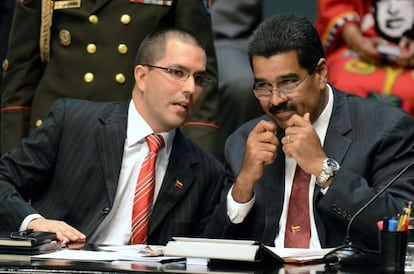Maduro appoints head of intelligence agency as new interior minister
Move by new Venezuelan president seen as attempt to keep opposition under control

Just 48 hours after he was sworn in following a close and controversial election, Venezuelan President Nicolás Maduro on Sunday appointed the head of the nation’s intelligence agency as his new interior minister in a move that many believe is designed to keep discontent by the opposition under control.
General Miguel Rodríguez Torres has spent the past 14 years in different intelligence positions, ever since the late President Hugo Chávez took office. Until Sunday, he was head of the Bolivarian Intelligence service Sebin.
Close to Chávez, Rodríguez was one of the five privileged officials who met with the late president in February at a Cuban hospital for five hours – the last time Maduro saw his mentor alive. Chávez died from cancer on March 5.
As he appointed his new Cabinet on Sunday, Maduro said that Rodríguez Torres will replace General Néstor Reverol to head up the new Ministry of Interior, Justice and Peace.
General Miguel Rodríguez Torres has spent the past 14 years in different intelligence positions
Maduro wanted to send a message of continuity following from the Chávez administration, by keeping 18 of the 32 ministers from the previous government. These include Jorge Giordani, the late president’s intellectual mentor, and members of the so-called High Political Command – a sort of de facto politbureau.
Elías Jaua, who was Chávez’s vice president until he named Maduro last year, will stay on as foreign minister.
Speaking in a nationwide address, Maduro called for “a revolution within a revolution” – a phrase that he has used in recent days and that some say reaffirms his determination to try to quell the opposition’s daily demands for a complete recount of the vote.
On Friday, the National Election Council (CNE) announced that it would audit 46 percent of the ballot boxes that were not checked following the presidential vote in Venezuela on April 14.
Opposition leader Henrique Capriles, who lost the race by 1.89 percentage points, has demanded a full recount after alleging a host of irregularities and voting violations at the polling stations. Maduro government officials had been reluctant to meet these demands, which last week ignited days of nationwide violence that left 11 dead and more than 60 people injured.
Capriles said that he believed that the audit would lead to a new election, and has called on his supporters to remain calm and not to commit any acts of violence or be provoked by Maduro’s backers.
Scores of Venezuelans across the country have been holding noisy protests, banging pots and pans every night to pressure the Maduro government into a recount.
Tibisay Lucena, the CNE director, explained that the audit will be held in an effort to put to rest allegations and suspicions that the government stole the elections. Members from both sides will be present when the auditing of the ballot boxes begins this week, she said. The entire process will take about a month.
Another member of the CNE, Sandra Oblitas, warned on Saturday that the audit is not a recount.
“It is important to keep in mind that audits do not lead to results,” she said. "The results announced on April 14 are irreversible, as always.”
Even though Maduro was sworn in as president on Friday, some governments have held off in officially recognizing him as Venezuela’s new leader. The United States and the European Union have both postponed recognizing the Maduro government.
Tu suscripción se está usando en otro dispositivo
¿Quieres añadir otro usuario a tu suscripción?
Si continúas leyendo en este dispositivo, no se podrá leer en el otro.
FlechaTu suscripción se está usando en otro dispositivo y solo puedes acceder a EL PAÍS desde un dispositivo a la vez.
Si quieres compartir tu cuenta, cambia tu suscripción a la modalidad Premium, así podrás añadir otro usuario. Cada uno accederá con su propia cuenta de email, lo que os permitirá personalizar vuestra experiencia en EL PAÍS.
¿Tienes una suscripción de empresa? Accede aquí para contratar más cuentas.
En el caso de no saber quién está usando tu cuenta, te recomendamos cambiar tu contraseña aquí.
Si decides continuar compartiendo tu cuenta, este mensaje se mostrará en tu dispositivo y en el de la otra persona que está usando tu cuenta de forma indefinida, afectando a tu experiencia de lectura. Puedes consultar aquí los términos y condiciones de la suscripción digital.








































